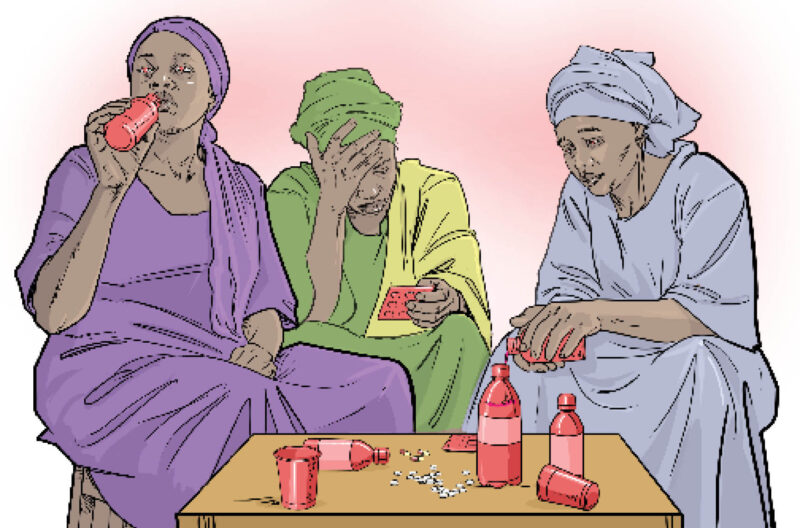“I was a student at a Federal College of Education then, living on campus. Every weekend, a friend who lived off-campus would bring bottles of cough syrup and my friends would take it and sleep like babies. I later took an interest and started taking it too. Although some of them used other drugs, cough syrup was my only choice. When my parents found out, they ordered my return home. That was the best decision because my parents placed me under close monitoring, which helped me stop the addiction. Another effective step they took was separating me from my friends. I have stopped now, and I don’t think I will ever go back to it,” she said.
This was the revelation of Maryam Sani, who is now rehabilitated. She said she was pushed into substance abuse out of depression and frustration. She explained that most women involved in drug use were usually frustrated or depressed.
“It is either through frustration or depression that some women begin to take drugs for relief, and before they know it, they are addicted. For younger girls, their boyfriends usually introduce them to drugs, especially when parents are not paying attention to what their daughters are doing or who they associate with. The situation requires parental vigilance, as well as God’s protection,” she said.
SPONSOR AD
Drug abuse has been of growing concern for families, society, and to a larger extent, the authorities. This growing burden has become overwhelming and taken various degrees of toll on the affected persons, with concerns becoming more vocal and strategic.
Weekend Trust spotlights some of the issues that have pushed women, especially married ones, into this downward trend. Speaking under anonymity, Hafsatu Idi (real name withheld), narrated her ordeal on how her life changed after meeting an older woman in Lagos. Idi said that at 22, she began taking hormonal drugs that flattened her breasts because she wanted to appear more masculine.
“I told them that I was a man, not a woman and begged to be taken to the male facility,” she said.

She said it was her much older friend of over 50 years that introduced her to substance abuse and even bought her male outfits to reinforce the ‘identity’.
Idi said she was once a chef at a prestigious hotel before her promising career was cut short after she was lured into drugs.
“I thank God that I am now back with my parents and in school again,” she said, adding that it was poverty and lack of contentment that led her into drugs. She explained that her initiator admired her beauty and paid her a huge amount of money to behave like a male in order to ‘please her sexually’.
She revealed that after rehabilitation, she regained her health and confidence, while her body assumed its natural shape.
For Aisha Hamidu, a mother of three in a polygamous marriage, the emotional agony became unbearable. She could not stand the thought of her husband being with his other wives, a simple truth that plunged her into a deep sense of despair.
Seeking an escape from the reality that had dawned on her, she turned to an unconventional solution. She said, “I needed a way to turn off my mind. When he was with them, I would take codeine and it would make me drowsy, help me to sleep and give me a temporary relief from pain and heartbreak.”
What started as a coping mechanism quickly spiralled out of control to become a comfort zone for her. The addiction worsened, consuming her life until she was eventually found and taken to a rehabilitation centre, a painful but necessary step towards reclaiming her life.
Rose Yohanna also narrated how substance abuse destroyed her life, sharing a story that revealed the devastating personal cost of addiction.
A former nurse, who many would believe should understand the medical and personal risks of substance abuse, ironically became a victim herself.
Rose confessed that she was driven to addiction by the emotional turmoil she experienced in her marriage. “I felt overwhelmed and helpless, so I began to take injections to forget my pain,” she recalled.
The temporary escape, however, came at a terrifying price. When she was admitted to the rehabilitation centre with her seven-week-old baby, she was told that the child could not stay with her because her breast milk was contaminated with drugs, making it unsafe for her newborn to consume.
“It was a horrifying reality that I was poisoning the baby I was supposed to be nourishing and protecting,” she explained. She also revealed that her first child already showed strange behaviours due to the long-term substance abuse during her pregnancy.

“These are the painful social consequences of addiction, not just for the person involved but the innocent lives they impact,” she noted.
Aisha Mohammed (real name withheld), a one-time chartered accountant from a prominent Adamawa background, also shared her experience, disclosing how her struggle began after her father’s death left her with property and wealth.
She said, “I inherited a huge amount of money and was overwhelmed. I wanted to feel in control, so I went into drugs. Each time I got high, I felt above everyone.”
She explained that despite her privileged background, she left her home at the GRA to live in Vinikland with a man she described as a street tout.
“I was already HIV positive before I met him, but I didn’t tell him,” she confessed.
She said drug use helped to deepen her attachment to the man, and at one point, she tested positive for four different substances.
“When I went deep into taking hard drugs, I began to lose my appetite for food, and that made me look like a skeleton. I was like a skeleton when I first came in for treatment,” she recalled.
After rehabilitation, she said she was able to rebuild her life, eventually getting married to a man who also lives with HIV. “It is not the end of life,” she reiterated, adding that she has since secured work as an accountant and is living happily with her husband.
The growing wave of drug abuse among women, especially young girls and married women, is also becoming a disturbing reality in Kaduna and other parts of Nigeria, raising the alarm among health advocates and community leaders.
A 24-year-old woman, who begged for anonymity, said she only completed secondary school before she started using drugs, adding that she has been abusing substances for about five years.
“I take codeine, rohypnol and marijuana. I don’t smoke cigarettes,” she said. On how she got introduced to drugs, she explained, “It was my friend who first introduced me to it. Whenever I take it, I feel charged; like I am in a different world. It gives me pleasure; and it doesn’t make me sleep.”
She narrated how she managed to keep her drug use a secret at home. “I have never been caught taking drugs because I don’t use them at home. And since I live in another town, anytime I return to Nasarawa State, I don’t take drugs. That’s why they don’t know about it,” she said.
She also said she once attempted to quit. “I tried to stop about a year ago, but I couldn’t. Depression made me go back. My boyfriend doesn’t take drugs, but I do. I don’t feel happy knowing that I am using drugs, especially because I have friends who don’t take them. I wish I were not doing this. The cost is another problem, especially with codeine, because a bottle is sold at N12,000 for regular users,” she noted.
Thirty-five-year-old Sa’adatu Usman, from Adamawa State, shared her story of struggle and recovery. She recalled her life before drugs as one full of hope. “Life was full of dreams. I was a young mother with hopes for school, family, and a better future. I was happily married, but vulnerable because I didn’t fully understand how to cope with pain and pressure.”

Her journey into drug use began with the influence of friends and her environment. “At first, it looked like something that would make me forget my worries. But slowly, I found myself depending on it as I experimented with substances that young people around me were taking. What started as a once-in-a-while thing became a daily routine.” The consequences, she explained, touched every part of her life. “It affected every part of me. My health deteriorated; I lost focus in my studies, and I grew distant from my family. I hurt people who cared about me. Financially, I wasted money that could have been used for better things.” What hurt most, she said, was losing herself: “Drugs took away my identity, my self-respect, and my peace of mind.”
Eventually, she decided to seek change. “I realised I couldn’t continue like that,” she said. With support from her family, she went into rehabilitation. The process was tough. “It was not easy. I had to fight my cravings, my emotions, and the stigma. But every day I stayed clean gave me more strength. The support around me made it possible.”
Even after recovery, the struggle did not disappear. “Yes, I struggled with the urges. The temptation never fully disappears. But I learned coping strategies; prayer, positive activities, avoiding old friends, and staying close to people who want the best for me.”
Now free from drugs since 2016, Sa’adatu says her life has completely changed. “I have peace of mind. I can dream, study and live again. I value relationships more, and I see myself with hope for the future.” Her message to other women is simple: “You are not alone, and you are not beyond help. Recovery is possible. Don’t be ashamed to ask for support. If I could rise again, so can you. Choose life, healing, and never give up on yourself.”
Twenty-five-year-old Safiyya Shafi’u from Katsina State described how her journey started with peer pressure in secondary school. “I heard my classmates talk about it all the time. They would invite me, but I never gave in. I always told myself it wasn’t for me. But one day, I followed them, and that was how it all began,” she said. They had even rented an apartment where they would gather with other students from across the state. “That place became our hideout. We smoked cannabis, cigarettes, and sometimes the boys brought alcohol, and danced to high music. It started small, but it kept growing,” she recalled.
At first, she managed to hide it from her family. “I took small quantities and made sure I wasn’t too high before going home. My parents didn’t suspect anything. But soon, I became addicted, and it was harder to cover up. My mother became suspicious and kept an eye on me, and eventually discovered the truth.”
The discovery shook her family. “They seized my phone, stopped me from going out, and later took me for tests and rehabilitation. It was a difficult process. The cravings were strong, and I felt ashamed, but with prayers and my family’s support, I began to heal,” she explained.
Safiyya believes she was only able to stop because her family refused to give up on her. “If they had abandoned me, I don’t think I would have recovered. Some of the people I used to do it with are still hooked. I’m grateful my parents stood by me. It wasn’t easy, but it is possible to stop with the right support.”
For many years, drug abuse has been seen as a problem that mainly affects men. It is often linked to young men who are unemployed or involved in crime. But this view does not tell the full story. Women are also using drugs; and their experiences are just as real. Some women turn to drugs because of personal struggles at home, financial hardship or emotional stress. Others use them in secret to deal with pain or loneliness.
Because of stigma and fear of judgement, women often hide their drug use issues, which makes it harder for them to find help. The effect is not only on them but also on their children, families and communities around them.
Weekend Trust spoke to women in some northern parts of the country to hear their experiences. Many of them shared how drug use started with small habits like taking painkillers or cough syrup before it grew into daily dependence. Some said they used drugs to escape from problems at home, while others said it was the only way they could cope with the pressures of life. Their stories reveal how widespread the issue is and how urgently it needs attention.
One of the women spoken to, Hafsat Mohammed, 20, from Kano State, shared her story, detailing a journey that began at 17 with cannabis use. Before this, she had only tried codeine and pills on two occasions, she said.
Hafsat explained that her drug use started a year after a traumatic experience, though she had been exposed to hard drugs and alcohol use while growing up. She was raped by two male friends, resulting in a pregnancy, which she aborted. “I was raped by two of my male friends at 16, got pregnant and had to abort it,” she said.
The emotional aftermath of this event significantly affected her mental health. She had already struggled with mental breakdowns before the incident. “It affected my mental health a lot. Even before then, I used to have bad mental breakdowns. My parents are divorced, so I grew up with my mother,” she narrated.
Now, she relies on cannabis supplied by a male friend as an escape route from the effects of her parents’ separation, she revealed.
Hafsat has not sought professional help, believing that if there’s a need for that, it would be for the trauma of the rape, not the drugs, which she claimed gave her a sense of calmness she desperately needed.
She described her routine as smoking and sleeping for extended periods. When the weight of her experiences becomes too much, she turns to drugs for relief. “I fall back on drugs when I feel too depressed and need relief. I smoke, get high and have long hours of sleep,” she said.

Also speaking in confidence to our reporter, Jamila Jimmy, a 21-year-old drug abuse victim, revealed that she was lured into drugs by her friends after a failed marriage. She explained that after her marriage collapsed, she realised the fault was partly hers and tried to reconcile with her ex-husband. However, he was adamant and vowed never to have anything to do with her again. When it became obvious that she was not going back to him, she got depressed; that was when her romance with drugs started.
“When I became very depressed, a friend who had just moved into the neighbourhood introduced me to ‘White.’ She told me that it could ‘wipe away my worries’. Surprisingly, it did, and I started buying it with my money. She also introduced me to cough syrup. That was when my parents found out I had been involved in drugs. They tried their best to save me. Thank God that I have reduced my drug intake, though I still take cough syrup from time to time,” Jimmy revealed.
She regrets being involved in drug abuse, stressing that it destroys people’s future. “I am just 21, but I look over 30. I am trying to get my life back. Starting is very easy, but stopping is a battle you cannot win alone. As we speak, several women are being initiated into drug abuse. I wish I had not listened to my friend that day,” she said remorsefully.
Another victim, who simply identified herself as Teema, told our reporter that peer influence dragged her into drug abuse. According to her, she was introduced to cough syrup at age 19, and at 25, she was still struggling to stop. According to her, cough syrup is the only drug she uses, noting that many of her friends take other intoxicants.
‘I didn’t know my wife was a drug addict’
A man who woke up to a rude shock of his wife being an addict after months of marriage, spoke with Weekend Trust under anonymity, narrating how he unknowingly married a wife who had gone deep into substance abuse, saying the experience left him traumatised and opened his eyes to the rising problem of drug abuse among women in the North.
He said he had no idea about his wife’s addiction until after their marriage.
“It was a very horrible experience, honestly. I pray you and your children never have to go through what I went through. Only Almighty Allah can reward me for the patience I had during my marriage to her,” he said.
He explained that during their courtship, she appeared healthy and well-composed, adding that he later discovered her mother and most of her family members knew about her addiction but kept it away from him. He said her mother ensured she avoided drugs on Fridays so she would look normal when he visited on Saturdays during their courtship. “They kept that part of her life away from me. If I had known, there was no way I would have married her,” he said.
He said the first signs began to appear after the marriage when he noticed some unusual behaviours. “Sometimes we’d be sitting together in the parlour, she would go to the kitchen, take a bottle of Coke, mix it with Benylin cough syrup and some other drugs and return to sit with me. I wouldn’t even notice the difference as I would think she was just taking a soft drink,” he recalled.
“Most times, when I get back from work, she is always asleep and hardly cooked. All through our marriage, we were mostly eating out. I then realised that once she took the drug, it knocked her out and she sleeps all through.”
According to him, the problem worsened whenever he travelled to Kaduna to see his other family. “Each time I left Abuja, she would call her friends, about three to five of them, who were also into drugs. They would come over and stay for two or three days. By the time I returned, I would discover that food items had disappeared, and I kept wondering what was happening,” he added.
He said his maid told him about some strange happenings anytime he was out of town, and he confronted his wife about her behaviour. She eventually confessed to being supplied by a dealer named Moses. “He would park at the estate gate and call her, and she would go out and collect the drugs herself so I wouldn’t know, he explained.

“Money never stayed long with her. Every Friday, before I travelled, I gave her N40,000 for airtime, but by Sunday she would call to say she had no airtime or money,” he also said.
He recalled that the situation once put him in fear and brought him to the realisation that he had to call it quits.
The marriage, which lasted eight months, ended in divorce. He advised men to conduct proper checks before marriage. “Men should conduct thorough due diligence before getting married. Don’t rely on street information; get the truth from someone close to the family. In my wildest dreams, I wouldn’t have thought she was an addict,” he recalled.
He added that the experience caused him trauma and taught him how widespread drug addiction has become among married women in the North.
“However, I see it as a failure of social integration. If you’re not careful, you get drawn into groups you shouldn’t belong to and start following their path,” he observed, adding that he had seen wealthy women in Abuja openly buying hard drugs.
He said the only consolation was that the marriage did not produce children. He also revealed that his ex-wife and her family had begged for reconciliation, but he refused. He prayed for God’s guidance, saying, “May Almighty Allah guide and protect us all.”
Divorce as a factor
Broken marriages have been said to be one of the reasons children abuse drugs. A mother, Halima Yakubu (real name withheld) corroborated this assertion while narrating her experience. She noted that her divorce led her daughter into drug abuse as her ex-husband married a woman who could not take care of her kids.
Revealing that her three children, including her only daughter, were left in the custody of her ex-husband, she expressed belief that her daughter, now 21, fell into substance abuse due to a lack of parental guidance. According to her, their stepmother did not show interest in her well-being and never bothered to ask where she went, what she ate or who her friends were, a situation that allowed her daughter to mingle with bad friends.
“The woman he married never cared for my children; and my ex-husband was busy with his lovey-dovey while my children went astray,” she said.
It was when the situation escalated that Halima’s attention was drawn to her daughter’s plight. With no other option, she was forced to admit her to a rehabilitation centre, which came at a significant cost of approximately N352,400 for a period of three months.
“My attention was drawn when it was too late, and I had to rush her to a rehabilitation centre to receive treatment. I was advised not to pay them frequent visits because of how my ex-husband was,” she explained. She prayed for divine intervention and advised divorced parents to ensure they cared for children in their custody so that they would not go astray.
She emphasised that God would hold those who fail in this duty accountable for their actions. “I pray that God guides every child who is in the custody of a stepmother/father. Men should know that God has given us children as an obligation. And he will ask us to account for their training in the hereafter,” she said.
Another parent, Mary Kyauta (real name withheld), also shared her story, explaining that her 22-year-old daughter was pushed into substance abuse after a devastating heartbreak.
“She fell in love with a man she dreamt of marrying. I had even started buying kitchen items for her, as we felt he would be sending his parents for a formal introduction at any moment. Then, my daughter saw a picture of his wedding card on a friend’s WhatsApp status, revealing that he was getting married in just two weeks,” Mary recounted.
Overwhelmed by shock and grief, her daughter began to isolate herself. “Despite all my reassurances, I saw her break down.
“I was busy with work and thought she had accepted her fate and moved on, not knowing that she had started abusing drugs,” Mary said.
The truth was discovered when her other daughter shouted that her sister had fainted.
“We rushed into the room and found different kinds of hard drugs. From the hospital, we were advised to take her to a rehabilitation centre,” Mary explained.

Support system, a necessity
Similarly, Ali Bukar, a resident of Bawo Road in Hausawa Quarters, Kano, told Weekend Trust that he had been counselling a young woman (name withheld) who was addicted to codeine. Bukar said the woman left Takai town in Takai Local Government Area for Kano city after disagreeing with her parents over a marriage proposal from a suitor she did not love.
“Unfortunately, mingling with wayward young women in the city changed her orientation, turning her into a codeine addict. I have been counselling her against the habit and advising her to stop associating with bad characters. Her parents love her and would never knowingly allow her to marry someone who could harm her. I am not sure she is ready to drop the habit because she no longer comes around,” Bukar said.
Usman Musa Dan Mari, chairman of Kano State Youth Awareness Against Drug Abuse and Other Related Crimes (KASYADAREC), said many factors were responsible for women’s involvement in substance abuse. He listed forced marriages, divorce, peer pressure and frustration or depression, especially among married women who have been abandoned by their spouses, as major triggers.
“The commonly abused drug, codeine syrup, used to be sold below N500, but today, because of the high demand from women abusing it, the price has risen to as much as N5,000. Some women resort to drug abuse when forced by their parents into unwanted marriages.
“Peer pressure also plays a critical role, while easy availability of drugs also makes it possible for them to be lured into the habit. It is, therefore, very advisable for parents to monitor the kind of friends their grown-up children associate with,” he advised.
He further narrated how a housewife who inherited a fortune from her late husband became bankrupt within six months. Investigations later revealed that she was heavily addicted to cocaine and recklessly wasted all her money and assets on the substance, Dan Mari recalled and urged for extra vigilance from parents, community leaders and stakeholders.
Aliyu Muhammad, a resident of Kaduna who interacts with drug users, especially women, described the trend as deeply troubling.
“The problem of drug abuse among women today is very disturbing. Even among married women, there are many who use drugs. I mingle a lot with people in brothels, and most women’s drug problems usually start from their relationships. If their boyfriends upset them, they take drugs or something else to forget their worries. When the ‘high’ kicks in, they start feeling like they are in another world.
“Women now use drugs more than men. And every woman abusing drugs knows exactly what she is getting into; it is not that someone is taking advantage of her. They all know their condition but choose to keep quiet. Unlike alcohol, it doesn’t make them stagger or behave drunkenly.
“Nowadays, even married women are into drugs. Codeine has almost entered every household because married women use it. But not everyone can afford it because of how expensive it is. A bottle costs between N12,000 and N15,000 for regular users. Some get it from their boyfriends, especially the single girls. Honestly, this is a very serious problem and there’s a need for deliberate action to tackle it within the community,” he said.
Margaret Kwa’ada Julius, the founder of The Eye Opener Youth and Women Foundation in Kaduna, lamented the rising rate of female drug abusers in communities, describing it as a shared societal problem.
“Yes, drug misuse among women in Nigeria is becoming more common. This is caused by many challenges they face, both at home and in society. We also have an overload of home responsibilities, poverty, trauma from hard experiences in Nigeria, such as kidnapping and banditry, neglect from husbands and lack of community help,” she noted.
For younger girls, she explained that poor parenting, abuse, neglect, trauma, discrimination and lack of emotional support were driving many into drug use.
“Sadly, many women do not feel safe asking for help because they fear being judged, shamed or stigmatised. This fear keeps them suffering in silence and becoming more addicted to drugs. Until the entire community begins to see drug misuse as a health issue and not a moral failure, many women will continue to hide instead of seeking help.
“We need more people to become recovery allies who support those struggling with drug misuse instead of blaming or rejecting them. Marriage counsellors, parents, teachers, faith leaders and drug prevention professionals all have a role to play. When a girl turns to drugs, it is often a sign that the adults and systems around her have failed,” she noted, calling for more empathy and community support.
She said, “In Kaduna State, the government has taken steps by setting up a treatment system for people who misuse drugs. However, the cost of treatment is not affordable for many. This is why prevention through awareness and education is very important. It is cheaper and more effective in the long run.
“Helping women and girls stay away from drugs is everyone’s responsibility. With the right support, understanding and teamwork, there is hope for a better future. We must go beyond sympathy for women struggling with drugs. The society must have empathy for women who misuse drugs. Above all, let faith leaders go back to their original assignments and do it well.”
Maimuna Garba Muhammad, a deputy commander of narcotics and assistant state commander of the Drug Demand Reduction Unit (DDRU), Kano State strategic command of the NDLEA, said the factors responsible for women’s indulgence in substance abuse included lack of proper upbringing, inadequate training and family support, frustration in marriages, flashy lifestyles of others and peer group pressure.
She said the function of the unit includes counselling, guidance, rehabilitation, sensitisation and collaboration with other stakeholders to sustain the fight against drug abuse.
The deputy commander cited the case of a female student of Bayero University Kano (name withheld), who was living off campus in a rented apartment while pursuing her undergraduate programme, but was picked up by NDLEA operatives for indulging in drug abuse. At home, the student, who hails from Kaduna State, appeared responsible, but at school, she was discovered to be a drug user, not a dealer. She was introduced to drugs by her boyfriend, whom she met on campus.
After undergoing counselling at the NDLEA rehabilitation unit, the parents of the student were cautioned against disowning her. Instead, they were advised to take her back and enrol her in a university nearby so that they could monitor her closely and avoid complicating her case.
“On several occasions, we picked up girls in age ranges of 17, 18, 19, 20 to 25 at hotels indulging in substance abuse. When asked why, they often say it is because of failed marriages, frustration, or because their parents are dead or unable to feed them, and they needed to survive.
“Some of them want to stop after counselling and treatment, but it is difficult. That is why we conduct follow-ups after clients leave. Some relapse into the habit. Treatment is not 100 per cent effective,” she noted.
She also recalled the case of an unmarried young woman (name withheld) who was brought to the unit for substance abuse but became pregnant during the process.
The young woman was kept at the facility for months to care for her and the unborn child and ensure that she did not abort the pregnancy. However, she later changed her SIM card and relocated to Jos to avoid stigma. She also narrated the case of a housewife involved in substance abuse, explaining that through counselling and religious sessions with clerics and family members, the woman returned to her husband and completely stopped the habit and now lives happily with her spouse.
Why women are vulnerable – Psychiatrist
Dr Amina Kasim Garba, a psychiatrist, says that substance abuse among women is often linked to deep-rooted vulnerabilities. “In my clinical practice, one of the most common factors I have seen is a history of abuse, particularly sexual abuse,” she explained. Many of her female patients battling substance use disorders had suffered such experiences, and for some, drugs became a coping mechanism or a form of escape. She added that untreated mental health conditions, such as depression or bipolar disorder, along with peer pressure from both male and female peers, also play a major role.
On the mental health side, Dr Amina warned that substance use can damage self-esteem and trigger other psychiatric conditions, including psychosis, a state in which “a person has a split from reality.” Because drug use alters brain chemistry, recovery is rarely straightforward. “This is why it can be difficult to quit without medical help or support, as the withdrawal symptoms can be debilitating,” she explained.
Families, meanwhile, often carry the burden, worrying about their loved ones, struggling with stigma, and facing financial strain from the high costs of rehabilitation.
Dr Amina stressed two major barriers that keep many women from seeking treatment: stigma and lack of support. The shame attached to drug use makes it difficult for women to open up, even when they desperately want help. “It is important for us to hold space and be safe spaces that people can share what they are going through without fear of shame,” she said.
Contributions from Ibrahim Musa Giginyu, Ahmad Datti, Kano, Fatima Boyi Mahuta, Amina Abdullahi, Yola, & Mohammed Yaba, Kaduna








